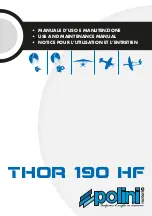
6
Figure 5. Engine Identification Label.
The Emission Compliance Period referred to on the
Emission Control or Air Index label indicates the
number of operating hours for which the engine has
been shown to meet Federal and CARB emission
requirements. The following table provides the Engine
Compliance Period (in hours) associated with the
category descriptor found on the certification label.
Emission Compliance Period (Hours)
EPA
CARB
Category C
250 hours
Moderate
125 hours
Category B
500 hours
Category A
1000 hours
Intermediate
250 hours
Extended
500 hours
Engine Identification Numbers
When ordering parts, or in any communication
involving an engine, always give the Model,
Specification, and Serial Numbers of the engine.
The engine identification numbers appear on a decal
(or decals) affixed to the engine shrouding. Include
letter suffixes, if there are any.
Record your engine identification numbers on the
identification label below (Figure 5) for future
reference.
Model Designation
Model CV20S for example: C designates Command
engine, V designates vertical crankshaft, and 20
designates horsepower. Some model numbers
(CV675) use a numerical designation rather than
horsepower. A letter suffix designates a specific
version as follows:
Suffix
Designates
S
Electric Start
ST
Electric/Retractable Start
Operating Instructions
Also read the operating instructions of the equipment
this engine powers.
Pre-Start Checklist
• Check oil level. Add oil if low. Do not overfill.
• Check fuel level. Add fuel if low.
• Check cooling air intake areas and external
surfaces of engine. Make sure they are clean and
unobstructed.
• Check that the air cleaner components and all
shrouds, equipment covers, and guards are in
place and securely fastened.
• Check that any clutches or transmissions are
disengaged or placed in neutral. This is especially
important on equipment with hydrostatic drive.
The shift lever must be exactly in neutral to
prevent resistance which could keep the engine
from starting.
WARNING: Lethal Exhaust Gases!
Engine exhaust gases contain poisonous carbon
monoxide. Carbon monoxide is odorless, colorless,
and can cause death if inhaled. Avoid inhaling exhaust
fumes, and never run the engine in a closed building
or confined area.
Cold Weather Starting Hints
1. Be sure to use the proper oil for the temperature
expected. See Figure 3 on page 5.
2. Declutch all possible external loads.
3. Be sure the battery is in good condition. A warm
battery has much more starting capacity than a
cold battery.
4. Use fresh winter grade fuel. NOTE: Winter grade
gasoline has higher volatility to improve starting.
Do not use gasoline left over from summer.
Refer to certification label for engine displacement.
Exhaust Emission Control System for models
CV17,18,20,22,23,25,675,730,740 is EM. Exhaust
Emission Control System for models CV26 and CV745
are EM, O2S, ECM, MFI.
IMPORTANT ENGINE INFORMATION
THIS ENGINE MEETS U.S. EPA AND CA 2005
AND LATER AND EC STAGE II (SN:4) EMISSION
REGS FOR SI SMALL OFF–ROAD ENGINES
KOHLER CO. KOHLER, WISCONSIN USA
EMISSION COMPLIANCE PERIOD:
EPA:
CARB:
CERTIFIED ON:
REFER TO OWNER'S MANUAL FOR HP RATING,
SAFETY, MAINTENANCE AND ADJUSTMENTS
FAMILY
TYPE APP
DISPL. (CC)
MODEL NO.
SPEC. NO.
SERIAL NO.
BUILD DATE
OEM PROD. NO.
1-800-544-2444 www.kohlerengines.com
N11236






































